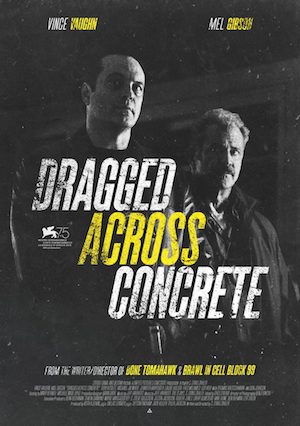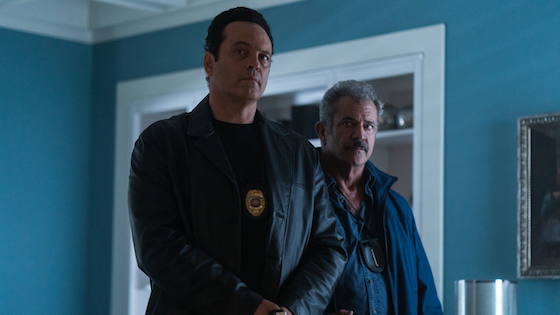
[Rating: Swiss Fist]

A timely character study rooted in the politics of authority, Dragged Across Concrete (showing now at Screenland Armour) is a decent (albeit complicated) movie full of writer/director S. Craig Zahler’s signature elements: laconic dialogue, remorseless violence, a muted color palette, and the absence of anything resembling sentimentality abound. Here, these elements are punctuated by career-best performances by leads Vince Vaughn and Mel Gibson. Yet at 159 minutes, the film feels every second as long as it is and might just as easily have worked in two hours with a tighter script and less of an insistence on narrative neutrality.
When the film opens, police officers Ridgeman (Gibson) and Lurasetti (Vaughn) are going through the motions of a routine drug bust. When their suspect runs, the pair deal with the man as one might expect, and while they don’t get Rodney King-rough, they’re just enough over the line that a cell phone video of the encounter leads to their suspension. Their supervisor, Lieutenant Calvert (Don Johnson), expresses remorse that he has to discipline them, but takes a beat to remind both that they live in the modern world, where stuff goes viral and trends on the web. Like most things in this movie, one can see both sides of the argument, here, for Ridgeman and Lurasetti did act inappropriately, yet no serious physical harm was done, and the suspect was unquestionably a bad guy who only got extra “attention” after resisting arrest.
Running parallel to this narrative thread is another about newly released African-American convict Henry (Tory Kittles), who gets to enjoy about half a day of freedom before he’s pulled back into the criminal underworld. Henry has a good heart and a straight moral compass, yet circumstances don’t allow him many options for income, which he desperately needs to take care of his family. Henry hooks up with a partner to pull off a job that will set them both up for a while, yet just like everything else in Dragged Across Concrete, nothing is as simple or straightforward as the characters want it to be.

It takes a little over an hour, but the stories of Ridgeman, Lurasetti, and Henry eventually intersect when the suspended cops decide to pull off their own score. Worlds collide, plans go awry, and, well … shit gets brutal, as it always does in Zahler’s films. When the action begins to ramp up, things get frenetic and chaotic, and the time the script spends with these characters begins to pay off. It’s hard to root for or against anyone, and Zahler seems content to just sit back and watch his carefully arranged dominos fall so that the real world he’s meticulously created can come to life. It’s a complicated approach to the narrative, for it is rare to find a movie that holds no position on what’s at stake for its leads, yet still allows for organic, earned actions to emerge.
The politics of Dragged Across Concrete are likewise complicated, for it holds to a sense of neutrality that makes for magnificent characters that feel both appropriate and incompatible to America’s current state. Zahler wants his audience to feel the nuance of morality in all characters, allowing a person to walk a mile in the shoes of a racist white cop or a newly released African American ex-con, both understanding and despising each in different proportions depending on one’s background or worldview. No one is wholly good or irredeemably bad: everyone lives in a world shaded in grays (hence the muted color palette).
Again, this is useful when fleshing out complex, lived-in characters, yet it puts the film in a position where it stands for nothing, and defiantly so. And that seems to be the point. Zahler doesn’t utilize a score, nor does he move his camera all that much; the audience isn’t guided, but rather seems to be there as little more than a neutral, uninvested party watching the chaos of flawed humanity play out to its logical, grotesque conclusion. It’s a form of cinematic nihilism that has been building since Bone Tomahawk right on through to Brawl On Cell Block 99, and it is cresting here. On the one hand, it seems like the bravest possible choice in today’s political climate, for in a perfect world, it pushes the work forward to speak wholly for itself.

But this world isn’t perfect, and in trying to utilize themes of police brutality, institutionalized racism, criminal justice reform, and the flaws of capitalism without taking a position on any of it, Zahler gives more credit to the politics of “both sides-ism” than he may have intended. It would be like Jonathan Demme making Silence of the Lambs in such a way that Hannibal Lecter comes out as morally ambiguous. Sometimes things are objectively bad, like murder-cannibalism, or racist police officers abusing their authority. Sure, there are gradations of “bad,” yet Zahler isn’t interested in parsing out or exploring that, instead just offering up the idea that it is there so his story can live in that world rent-free.
So, besides being really goddamned long, this movie has a messaging problem (in that it has none). And while every film and filmmaker doesn’t need to have a message, or a grand statement, when dealing with the volatile subjects Dragged Across Concrete toys with, not taking a stand is itself a statement. As a character exploration and neutral look at an ugly world, the film is fantastic, as are all of Zahler’s movies when taken only on their artistic merits. Gibson, as the racist yet pragmatic cop with an iron-clad sense of justice, is doing his best work in 20 years, here, and creates a roadmap to how the troubled actor could be responsibly utilized going forward (leaning into the man’s real-life issues). Like Gibson, the movie works if one takes a step back and evaluates it just for what’s on the screen. Again, like Gibson’s casting, this works better in theory than in practice if a person allows for more than a minute to think about it.





Comments on this entry are closed.